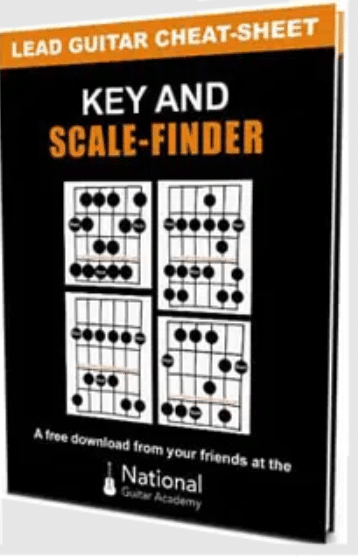Understanding tablature isn’t always easy – let us get you educated on the various guitar tab symbols that you’ll encounter!
Over 100,000 guitar-learners get our world-class guitar tips & tutorials sent straight to their inbox:
Click here to join them
Get our best guitar tips & videos
In this free lesson you will learn…
- 11 guitar tab symbols & how to play them
- How to incorporate these techniques into your playing with playable examples
- Tips for making these techniques sound tighter!
- Tips for beginner, intermediate & advanced techniques
An Intro To Guitar Tab Symbols
Learning to read tablature is a pretty straight-forward process on the surface.
The details however, take us much deeper.
- With the language of tablature comes a variety of guitar tab symbols that we should learn and memorize.
- These symbols help give us better and more direct instruction on how to play a piece of music.
- Having a significant amount of musical direction helps guide our hand toward playing with better technique and feeling.
In today’s lesson, we’re going to explore the most common guitar tab symbols that you will find in tab books as well as online resources.
It’s important that you grab your practice journal for this one to keep track of the different symbols we talk about. Don’t forget a pencil!

How To Read Tablature
For the purposes of this article, we’re going to operate on the assumption that you already know the basics of tablature.
If you’re lost on the concept of tablature and how to use it, click here for a catch-up lesson.
For a quick refresher before we get to the guitar tab symbols, we read our strings in the following order in tablature:
High E
B
G
D
A
Low E
Remember that our frets are indicated by the numbers on each string line of the tab.
As well, fret numbers that are stacked on top of one another indicate that a chord should be played.
Now that we’ve got that out of the way, let’s move on to why we should learn about guitar tab symbols!
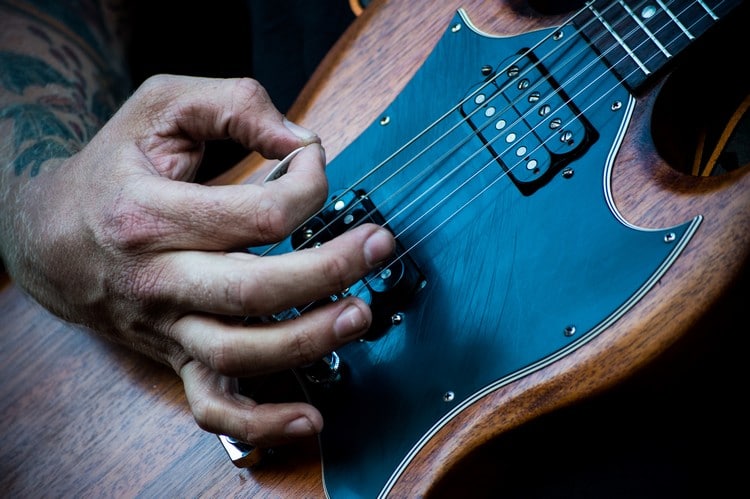
Download our lead guitar cheat-sheet to make things easier
It's hard to understand which scales work with which keys.
So we created a cheat-sheet! A key and scale-finder that you can use again and again.
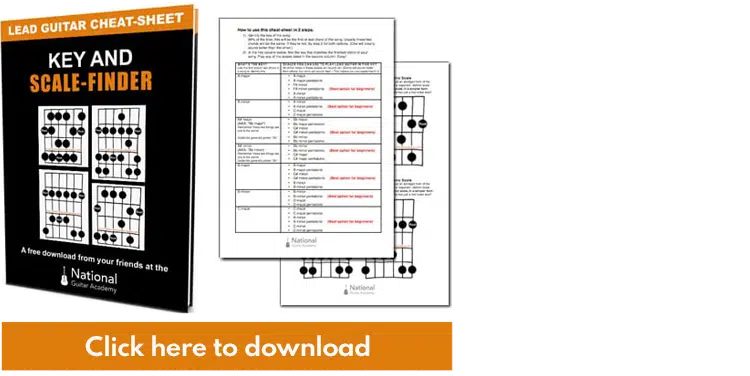
Get your personalised guitar-learning plan 🎸
Get a custom guitar-learning plan here: Click here for GuitarMetrics™
World-Class Guitar Courses 🌎
Learn from the world's best guitar educators: Click here for our guitar courses
Why Should We Learn This?
Guitar tab symbols give us musical direction much the same as traditional notation does.
It’s well and good to learn the proper progression of notes in a song.
- If we don’t learn how to play with the same type of feeling and technique as the artist who recorded the song, it won’t sound the same.
- Each of these symbols implies the use of a different technique, and so it’s important to familiarize ourselves with these techniques as we go along.
- We’ve included detailed explanations of how to execute each technique, as well as the difficulty level.
Try to start with the beginner techniques and not jump ahead if you’re just starting out.
We’ve arranged everything in order of difficulty, so take your time learning these guitar tab symbols and go with what works for your comfort level.
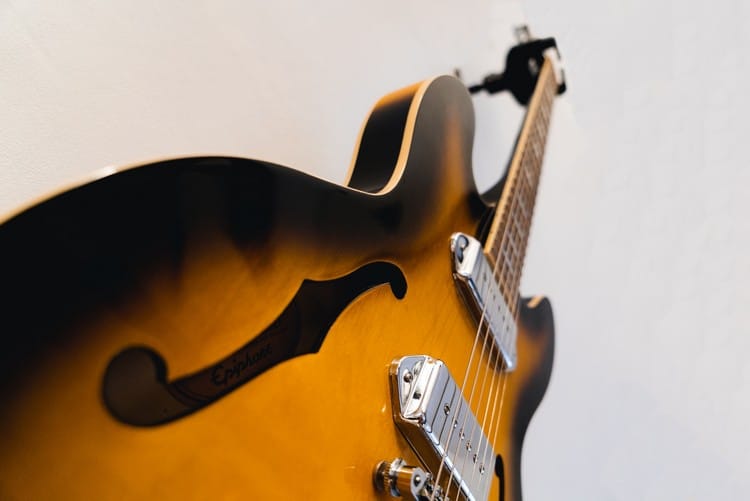
Pro Tip: Don’t ever shy away from learning new techniques and gaining new knowledge about your favourite instrument.
Progress is not something to fear, no matter how intimidating it may look on the outside.
- Venture towards setting goals for yourself and your guitar, and you’ll maximize your learning capability.
- On that note – we’ve said it before and we’ll say it again – start keeping a practice journal.
- Being able to visualize and reflect on our progress is so important.
Keeping a log of your daily practice and what you have improved upon will not just give you better perspective – it will dramatically boost your confidence as well.
Now, let’s talk technique.

Guitar Tab Symbols: Sliding (Difficulty: Beginner)
The fretboard is a smooth surface, despite the frets.
This makes it easy to start learning how to incorporate sliding into our playing early on.
Sliding is a commonly-used technique that gives a smooth and glidey feeling to our playing.
These guitar tab symbols will tell you what direction to slide in – either up or down the fretboard.
Slide Up (toward the 12th fret) = /
Slide Down (toward the nut) = \
This is a great technique to incorporate into any guitar solo to help us navigate the fretboard.
Try the example below to get a feel for sliding in both directions.

Sliding helps us develop fluid motion in our playing style, and these guitar tab symbols are very direct in showing us what to play.
This makes sliding a great technique to add to our repertoire early on in our guitar journey.
Pro Tip: Try sliding for different lengths across the fretboard to experiment with the sound and technique. You can cover a lot of ground with this handy skill.
Now that you’ve tried playing the riff above, you can hear how it should sound below:
Guitar Tab Symbols: Hammer-Ons & Pull-Offs (Difficulty: Beginner)
Hammer-ons and pull-offs are great techniques to learn in order to tighten up our playing style and take some pressure off of our picking hand.
- These guitar tab symbols are easy to read, and most often will only be indicated by a bent line over two fret numbers.
- In order to perform a hammer-on, start by picking a note on any string with your index finger.
- Next, ‘hammer-on’ with your ring finger on the same string, two frets up.
You should try to hit the string with a good amount of force, and then hold your ring finger in place so the note can resonate.

To perform a pull-off, pick a note on any string with your ring finger, and hold your index finger two frets back on the same string.
- Once you have picked the first note, pull your ring finger off of the string by pulling down and off.
- This will cause the string to resonate on the note being held by your index finger, resulting in a pull-off.
- These guitar tab symbols require you to pay attention to the tab you’re reading. If two notes are connected with this symbol, look at the order.
If a higher note progresses to a lower note using these guitar tab symbols, assume it’s a pull off.
If a lower note goes higher, assume hammer-ons.
Guitar Tab Symbols: Bending (Difficulty: Intermediate)
Bending can take a few different forms, and it can take a little bit to get used to the feeling of bending guitar strings.
- Give yourself some time and patience with this one.
- These types of guitar tab symbols will indicate to you exactly what type of bend you should be performing, as well as where to release the note.
Our main types of bends are:
Decorative Bend – ¼ tone
Half Bend – 1 fret distance
Full Bend – 2 fret distance
Unison Bend – Bending one note up to meet the pitch of another note
Take a look at the tab below to see all of the different illustrations of the bends listed above, as well as some other handy techniques.
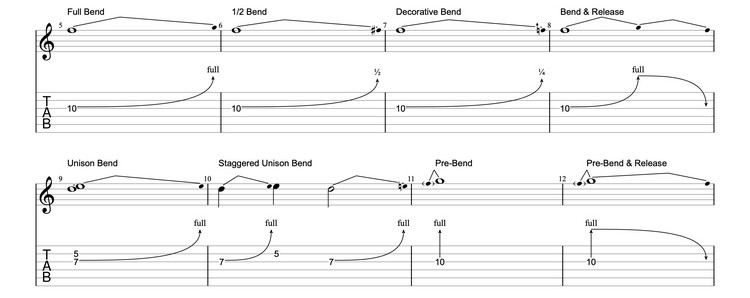
In the tab above, we explore each of the main types of bend techniques.
It’s important to talk about reinforced bending in this section as well.
Pro Tip: Reinforced bends are when we bend a string using multiple fingers.
For example, in order to execute a full bend more easily, we can bend with both our ring finger and our middle finger.
This will help us hit our target note with less of a struggle, especially when that note is further away.
Check out the audio clip below to hear each type of bend.
Guitar Tab Symbols: Vibrato (Difficulty: Beginner to Intermediate)
Vibrato is how we sing as guitarists.
This technique adds a sparkle and shine to our note selection, and helps add a more vocal component to the guitar’s sound.
- To perform vibrato, simply move your fret-hand finger back and forth across the fret as you play the intended note.
- The traditional guitar tab symbols used for this technique are squiggly lines (displayed below), but some of us have other options available as well.
- For those of us playing guitars with a tremolo arm, we can perform a slightly different variation on this technique.
Use the tremolo arm to vibrate the last note in a musical phrase for added emphasis.
Check out the tabs to see these guitar tab symbols in context:

Pro Tip: The vibrato technique is one of the more personal parts of guitar playing.
Countless players have defined their guitar playing (and guitar tone) by their vibrato.
For some great examples, check out:
- Fallujah (skip to 1:40 for example)
- Plini
- Stevie Ray Vaughan
- Steve Vai
It can take a long time to perfect the sound that you want to get out of your vibrato.
Give it the time and patience you need to create a beautiful vibrato technique and let your notes sing!
Guitar Tab Symbols: Muting & Palm-Muting (Difficulty: Intermediate)
String muting is a technique often found in funk music and other rhythm-based genres.
The guitar tab symbols used for this technique are simply an X where the fret number would normally be.
- We may also see a set of six X’s across the entire tab to indicate muting of all strings.
- String muting can be as easy or as difficult as we want it to be, depending upon how it is being used.
- Palm muting can be a bit trickier of a skill to master, as there are varying degrees of this technique that we can apply.
Palm muting is indicated by a ‘PM’ above the section in need of muting.

Pro Tip: Palm muting works on all types of guitars – even classical!
Place the side of your hand over the strings at the bridge to suppress the sound of the strings.
- For a tighter palm mute, slide your hand up toward the strings.
- For a more loose palm mute, move down slightly past the bridge.
- These guitar tab symbols won’t tell you whether to palm mute loose or tightly, so use your better judgment.
For more info on palm muting, check out this Gear Gods article on how to improve your guitar tone. (See Section 9)
Guitar Tab Symbols: Raising The Octave (Difficulty: Advanced)
This technique is for those advanced players with a heightened knowledge of the fretboard.
- These ‘8va’ guitar tab symbols are less commonly used, but indicates that we should play the indicated passage of music one octave higher than what is written.
- This symbol is usually used over shorter passages, and is typically cancelled out by the italicized symbol ‘loco’.
We’ve also included the Let Ring symbol here, which means to simply let a note ring out for the duration of the bar.

Although these are not very necessary guitar tab symbols to learn right away, it helps to know what they stand for when we see them in a tab we are learning.
Pro Tip: A good rule of thumb to learn about octaves is this:
The octave up from your low E and A strings is two frets and two strings up.
The octave up from your D and G strings is three frets over and two strings up.
Start putting this into practice by playing different passages of music in different octaves.
This can be practiced with any song, and will help tune your ears to the sound of different octaves.
Try it over Seven Nation Army! (ATTN: Insert link to How To Play Seven Nation Army article here)

Learn 12 EASY beginner chords with our popular guide
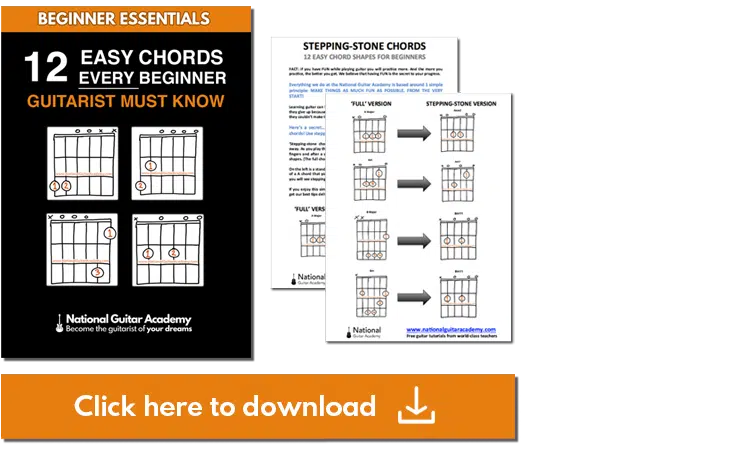
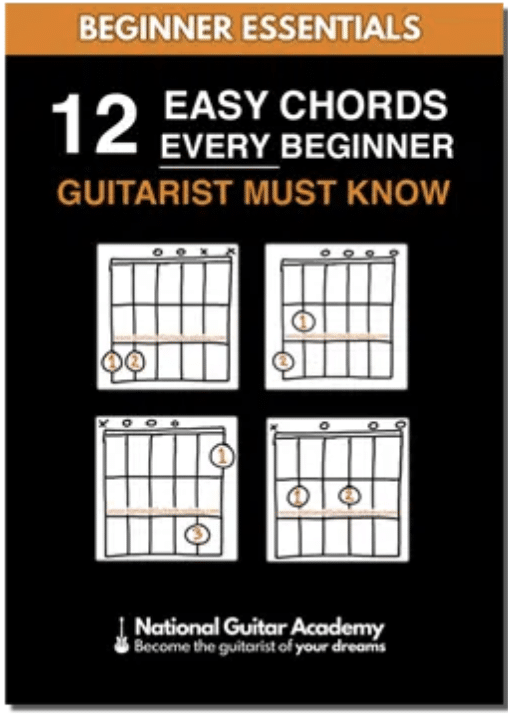
Where should we send it?
✅ Stop struggling. Start making music.
✅ Learn beginner-friendly versions of every chord.
This is our most popular guide and it will improve your chord ability quickly! 😎
Get your own personalised guitar-learning plan 🎸
Get a custom guitar-learning plan here: Click here for GuitarMetrics™
World-Class Guitar Courses 🌎
Learn from the world's best guitar educators: Click here for our guitar courses
Guitar Tab Symbols: Raking, Tremolo & Harmonics (Difficulty: Advanced)
In this last section, we wanted to include a few of the odds-and-ends types of symbols you might encounter.
- Although these aren’t as commonly used in tablature, we will still see them especially as our skills evolve.
- Raking (or brush-stroking) is simply the act of strumming a chord in one direction or another with your pick, and is indicated with an arrow next to the chord.
- This technique adds definition to a chord to help it stand out from a progression.
Tremolo picking involves repeatedly picking the same note for a period of time measured in note length.
This is a common technique used in metal music, and these guitar tab symbols will pop up often in that genre.
One dash symbol indicates 8th note tremolo picking. Two dashes indicates 16th note picking, and 3 dashes indicated 32nd note picking.

Natural harmonics are a really interesting part of the guitar, as they are naturally-occurring higher frequencies that can be accessed with a specific technique.
- To play a harmonic, place your finger over the 7th fret wire on any string but don’t fret the note.
- Instead, while your finger rests lightly on the string, pluck it with your pick.
- Release your finger as you pick the string and a natural harmonic will sound out.
These harmonics occur naturally at the 5th, 7th and 12th frets, so experiment with them to see how they sound!
Where Do I Go From Here?
If you’re looking for more ways to make use of your new-found knowledge of guitar tab symbols, we recommend:
- Start writing guitar riffs that make use of the techniques we discussed in this article
- Write out tabs of your own using these symbols to help you memorize them – Get creative!
- Review these guitar tab symbols and techniques with your guitar teacher
- Learn a new song that uses the techniques we discussed today
- Head to an open mic or a concert to see how other guitarists make use of techniques like bending and hammer-ons!
Recommended Resources
If you enjoyed this free guitar lesson, you’re going to love some of the other content we’ve prepared for you below:
- How to Play the F Barre Chord
- Learn Every Chord With Our Capo Chart!
- What’s The Best Beginner Guitar?
- 5 Guitar Songs For Beginners
- Guitar Arpeggios: The Ultimate Guide
What Type of Guitarist Are You?
Take our 60-second quiz & get your results: Take The Quiz
Join the world's best online guitar school 🌎
- Get your own personalised guitar learning plan (customised just for YOU).
- World-class online guitar courses. Learn at your own pace.
- Community Campus & Learning Forum - A friendly community! Connect with our team & students. 😊
- Beginner Song library with chordsheets, tabs and tips. (Songs suitable for all levels!)
- Regular live streams, seminars and Q&A sessions - Learn from world-class guitar educators. Get all your questions answered!
Click here to learn more about National Guitar Academy membership 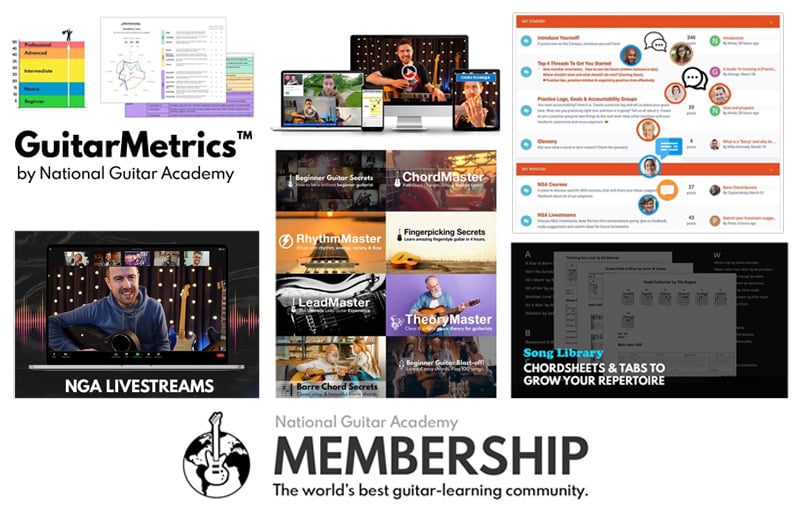
Cool Guitar T-shirts 😎
Look cooler! Check out our merch: Click here to see our merch store
Want free guitar tips and video lessons delivered to your inbox?
Join over 100,000 guitar-learners and subscribe to our guitar-tips-by-email service. (It's free.)
We'll send you a series of lessons that will move you to the next level of your guitar journey.
Learn how everything fits together quickly, easily and effectively. We share ninja tips (for instant fun!) but also timeless fundamentals that will deepen your understanding.


Get our best guitar tips & videos
Popular Lessons
How To Learn Guitar: An 11-Step Programme For Beginners
How To Choose The Perfect Beginner Guitar
More Cool Guitar Stuff
Learn about National Guitar Academy: About Us
Join us on Facebook for daily guitar tips.
Listen to our Learn Guitar Podcast for rapid guitar progress.
Check out our free chord lessons.

